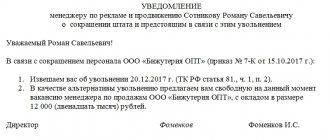Who must notify the debtor about the assignment of the claim (right)
Both the old creditor (assignor) and the new creditor (assignee) have the right to notify the debtor. If the assignment agreement has not assigned the obligation to notify the debtor to a specific party to the agreement, it is more convenient if the assignor does this. The fact is that if the debtor receives a notice from the assignee, he may refuse to fulfill his obligation until he receives evidence of the transfer of rights. If the assignor notifies him, the debtor has no right to demand evidence and delay execution (clause 1 of Article 385 of the Civil Code of the Russian Federation).
How can you notify the debtor?
In practice, the debtor is notified of the assignment in the following ways:
- draw up a notice of assignment in writing and send it to the debtor;
- provide the debtor with the assignment agreement and (or) documents related to this agreement for review. In particular, this may be an act that formalizes the transfer of rights under an assignment agreement. It is important that the debtor legibly marks the document with an acknowledgment mark, date, signature and seal (if any). If the mark is made by a representative of the debtor, you must additionally indicate a document confirming his authority.
An example of a mark on an assignment agreement or deed of transfer of rights
We hereby confirm that Andromeda LLC has been notified of the assignment of the claim to Sigma LLC in accordance with the terms of the assignment agreement dated 02/08/2019.
12.02.2019
First Deputy
general director
LLC "Andromeda"
by power of attorney dated January 21, 2019 N 5 ________ /Popov S.I./
M.P.
Article 385. Notification of the debtor about the transfer of rights
Ruling of the Supreme Court of the Russian Federation dated February 17, 2017 N 309-ES16-20475 in case N A50-26340/2015 Having assessed the evidence presented in the case materials in accordance with Article 71 of the Arbitration Procedure Code of the Russian Federation, having studied the terms of the agreement concluded between the Transengineering company and the Polymer Construction Service company agreement dated 06/09/2014 N 15, as well as the assignment agreement concluded between the Transengineering company and the Eurasia company dated 09/08/2015, guided by articles 183, 309, 310, 382, 384, 385, 389, 432, 486, 487, 516 of the Civil Code of the Russian Federation, in the absence of evidence of payment for the goods received in the amount of RUB 2,050,053. 00 kopecks, the courts of first and appellate instances came to the conclusion that the stated requirements were justified.
Ruling of the Supreme Court of the Russian Federation dated February 22, 2017 N 309-ES16-16532 in case N A60-58308/2015
Having examined and assessed the evidence presented in the case materials according to the rules of Article 71 of the Arbitration Procedural Code of the Russian Federation, having established the fact that the company “Project Works” performed work under a municipal contract and their acceptance by the Administration without comments, the latter’s failure to fulfill the obligation to pay for the work and the presence of arrears in the declared amount, the right to claim which was transferred to the Division-Project company on the basis of an assignment agreement, the courts, guided by Articles 309, 310, 312, 382, 384, 385, 448, 711, 758, 763, 768 of the Civil Code of the Russian Federation, taking into account the legal position , set out in paragraph 14 of the information letter of the Presidium of the Supreme Arbitration Court of the Russian Federation dated October 30, 2007 N 120 “Review of the practice of application by arbitration courts of the provisions of Chapter 24 of the Civil Code of the Russian Federation,” came to the conclusion that there were grounds to satisfy the claim.
Ruling of the Supreme Court of the Russian Federation dated April 14, 2017 N 309-ES17-2807 in case N A07-22276/2015
The courts were guided by Articles 195, 196, paragraph 2 of Article 199, paragraph 1 of Article 200, Article 204, paragraph 1 of Article 382, paragraph 2 of Article 385, paragraph 1 of Article 390, paragraph 1 of Article 432, paragraphs 1, 2 of Article 450 of the Civil Code of the Russian Federation , paragraph 11 of the information letter dated October 30, 2007 N 120 “Review of the practice of application by arbitration courts of the provisions of Chapter 24 of the Civil Code of the Russian Federation.”
Ruling of the Supreme Court of the Russian Federation dated April 25, 2017 N 305-ES17-3664 in case N A40-153373/2014
Refusing to terminate enforcement proceedings in the case of collection of debt under a license agreement and penalties, the court was guided by Articles 312, 382, 385 of the Civil Code of the Russian Federation, Part 1 of Article 327 of the Arbitration Procedure Code of the Russian Federation, Clause 1 of Part 1 of Article 43, Article 45 of the Federal Law dated 02.10.2007 N 229-FZ “On Enforcement Proceedings”, explanations given by the Presidium of the Supreme Arbitration Court of the Russian Federation in paragraph 14 of the Review of the practice of application by arbitration courts of the provisions of Chapter 24 of the Civil Code of the Russian Federation dated 30.10.2007 N 120, and proceeded from the lack of legal grounds for termination of enforcement proceedings due to the defendant's execution of a court decision before the initiation of enforcement proceedings by the bailiff, also indicating the unlawful fulfillment of obligations by the defendant to the original creditor after receiving notification of the assignment of the right of claim. The court found that the debtor was presented with evidence of the transfer of the right to claim the disputed debt to a new creditor, and therefore the debtor had no right to fulfill the obligation to the original creditor, who had withdrawn from the obligation relationship with the named debtor.
Ruling of the Supreme Court of the Russian Federation dated April 28, 2017 N 305-ES17-3875 in case N A40-156127/2015
The courts also take into account the provisions of paragraph 3 of Article 382, paragraph 1 of Article 385 of the Civil Code of the Russian Federation, by virtue of which the possibility of submitting a repeated claim to the debtor in relation to the fulfilled obligation is excluded, and also taking into account that the company was duly notified of the assignment of the right , transferring the right of claim to the assignee, came to the conclusion that there is no risk of collecting interest from the plaintiff in the event of execution of the claim to an improper creditor.
Ruling of the Supreme Court of the Russian Federation dated June 26, 2017 N 301-ES17-7516 in case N A43-35045/2015
In their conclusions, the courts were guided by the provisions of paragraph 1 of Article 382, Article 384, paragraph 2 of Article 385, paragraph 1 of Article 388, paragraph 1 of Article 711, paragraph 1 of Article 720, paragraph 1 of Article 740, paragraph 1 of Article 746, Article 753 of the Civil Code of the Russian Federation , paragraph 72 of the resolution of the Plenum of the Supreme Court of the Russian Federation dated March 24, 2016 N “On the application by courts of certain provisions of the Civil Code of the Russian Federation on liability for violation of obligations”, paragraphs 8, 14 of the information letter of the Presidium of the Supreme Arbitration Court of the Russian Federation dated January 24, 2000 N “Review practice of resolving disputes under a construction contract", paragraph 6 of the information letter of the Presidium of the Supreme Arbitration Court of the Russian Federation dated October 30, 2007 N 120 "Review of the practice of application by arbitration courts of the provisions of Chapter 24 of the Civil Code of the Russian Federation."
Ruling of the Supreme Court of the Russian Federation dated July 31, 2017 N 303-ES17-8588 in case N A73-4995/2016
When considering this dispute, the courts were guided by Articles 382, 385, 388, 431, 522, 539, 544, 548 of the Civil Code of the Russian Federation, the provisions of the Housing Code, the Rules for the provision of utility services to owners and users of premises in apartment buildings and residential buildings, approved by a resolution of the Government of the Russian Federation Federation dated 05/06/2011 N 354, Rules mandatory when a management organization or a homeowners’ association or a housing cooperative or other specialized consumer cooperative concludes contracts with resource supply organizations, approved by Decree of the Government of the Russian Federation dated 02/14/2012 N 124.
Ruling of the Supreme Court of the Russian Federation dated August 1, 2017 N 303-ES17-9387 in case N A73-6517/2016
When considering this dispute, the courts were guided by Articles 309, 310, 382, 385, 388, 431, 522, 539, 544, 548 of the Civil Code of the Russian Federation, the provisions of the Housing Code of the Russian Federation, the Rules for the provision of utility services to owners and users of premises in apartment buildings and residential houses approved by Decree of the Government of the Russian Federation dated 05/06/2011 N 354, Rules mandatory when a management organization or homeowners association or a housing cooperative or other specialized consumer cooperative concludes contracts with resource supply organizations approved by Decree of the Government of the Russian Federation dated 02/14/2012 N 124.
Ruling of the Supreme Court of the Russian Federation dated 08.08.2017 N 304-ES17-10094 in case N A75-1438/2016
Refusing the application and agreeing with this conclusion, the courts of appeal and the district were guided by Article 385 of the Civil Code of the Russian Federation, Articles 71, 75 of the Arbitration Procedure Code of the Russian Federation and pointed out the lack of adequate evidence of the transfer to the Factor company of the claim against the debtor under the agreement on innovations dated March 26, 2002.
Ruling of the Supreme Court of the Russian Federation dated August 30, 2017 N 308-ES17-11812 in case N A20-2066/2016
Having assessed the evidence presented in its totality and mutual connection in accordance with Article 71 of the Arbitration Procedural Code of the Russian Federation, having established that the Instroy company (contractor) on the basis of state contract dated 09.09.2014 N 45-RKA carried out work on the reconstruction of the Deyskoye-Nizhny highway Kurp - border with the Republic of North Ossetia Alania in the amount of 71,211,421 rubles 57 kopecks, which were accepted by the Ministry of Transport and Road Facilities of the Kabardino-Balkarian Republic (the defendant’s predecessor, the customer) without comments on the volume and quality of the work performed, but were not paid; under agreements on the assignment of claims dated 04/26/2016 and 06/21/2016, the right to claim payment of debt for work performed in part was transferred; the work was completed by the contractor in full, in connection with which a monetary debt was assigned under an obligation in which the identity of the creditor is not significant for the debtor; the legislation does not contain a prohibition on the assignment of claims under a government contract to third parties after its execution by the contractor; the defendant was notified of the assignment of the claim; fulfillment of an obligation made to an improper creditor does not terminate the obligation to repay the debt, guided by the provisions of Articles 382, 384, 385, 388, 408, 448, 711, 753, 763 of the Civil Code of the Russian Federation, Federal Law dated 04/05/2013 N 44-FZ “On contract system in the field of procurement of goods, works, services to meet state and municipal needs,” the courts came to the conclusion that there were grounds to satisfy the claim.
Ruling of the Supreme Court of the Russian Federation dated September 25, 2017 N 305-ES16-17731 in case N A40-45643/2007
Satisfying the application for procedural succession, the cassation court was guided by Article 48 of the Code, the provisions of Articles 382, 384, 385 of the Civil Code of the Russian Federation and proceeded from the proof of the fact of transfer of rights from the original creditor to the new one, as well as the absence of grounds for applying paragraph 2 of Article 388 of the Civil Code of the Russian Federation Federation, which is also confirmed by judicial acts that have entered into legal force in case No. A40-96908/2016.
How to draw up a notice of assignment of a claim (right)
Provide notice to the debtor in writing. This will protect the new lender from adverse consequences. For example, a debtor may fulfill an obligation to a former creditor, citing the fact that he did not receive notification. In this case, the debtor’s obligation will cease and, therefore, the new creditor will not be able to demand performance (clause 3 of Article 382 of the Civil Code of the Russian Federation).
It is important to know! Assignment of claim (cession)
The notice must be signed by the manager or a person authorized by the power of attorney. We recommend that you write the notice on company letterhead and certify the signature with a seal, if you have one.
In the notification please indicate:
- data that will allow you to identify the new creditor: name, OGRN and (or) TIN - for organizations; Full name, gender, date and place of birth - for individuals;
- information about the claim that has passed to the new creditor: its type (payment of debt, delivery of goods, performance of work, etc.), volume (size) and basis for its occurrence (details of the agreement between the debtor and the old creditor);
- date of transfer of the claim to the new creditor;
- information necessary for the debtor to fulfill the obligation, for example, details for transferring funds.
The information in the notice must be sufficient to enable the debtor to identify the new creditor and the scope of rights that have passed to him, and to fulfill his obligation. Otherwise, the debtor has the right to fulfill the obligation to the old creditor or suspend execution and demand the necessary information from the original creditor.
Is it necessary to attach a copy of the assignment agreement to the notification?
It is not necessary to attach a copy of the assignment agreement to the notice or present the agreement to the debtor. However, you may include a copy of the agreement with the notice to show the debtor proof of the transfer of rights.
Is it possible to transfer the right of claim without the consent of the debtor?
Rights are transferred under an assignment agreement, which is also an agreement for the assignment of claims. The agreement is concluded by the creditor - the one to whom the debt is owed, and the new creditor - the one to whom the debtor will owe money after the paperwork is completed.
For example, the owner of a cafe entered into a contract for the supply of craft paper for burgers. Then I was unable to transfer the payment on time and owed the supplier 50,000 rubles, and on top of that a penalty of 2,000 rubles. The supplier is the cafe owner's creditor, and he is his debtor. The supplier does not have time to deal with the debts, so he sells the debt to a law firm - a new creditor. In the same way, banks sell loan debts to collectors.
We wrote in detail about how the transfer of rights and debts is formalized in a separate article.
To assign the right to claim money, the consent of the debtor is not required. The logic is this: the debtor doesn’t care who to pay. The creditor can sell the right of claim, even if the contract contains a prohibition clause or the obligatory consent of the debtor. In our example, the supplier does not have to ask the cafe owner’s consent to sell the craft debt to lawyers. The clauses of the supply agreement do not change the matter.
As a general rule, it is also possible to assign a non-monetary right of claim But there is a condition: the assignment should not complicate the debtor’s obligation. Let’s imagine that in our example, the owner of a burger shop, in addition to paying for the craft, is obliged to return the reusable container. The supplier can safely cede the right to claim money. But the demand to return the containers can be ceded only if the buyer does not have to spend significantly more money or time, for example, transporting the boxes to a warehouse in a neighboring city.
If there is a clause in the contract that prohibits assigning a non-monetary claim , then this cannot be done.
The debtor is obliged to pay the new creditor and forget about the old one only when he has been notified in writing of the assignment of rights. We’ll return to the notification below.
It is also important to know that the creditor can sell the debt at any time:
- while the contract is being fulfilled and payment is awaiting,
- when there was a delay,
- at the stage of pre-trial claims,
- in a court,
- in enforcement proceedings - when the creditor has received a writ of execution and is working with the bailiffs or the bank.
Now to the main thing: what rights does the debtor have before the new creditor?
In what order should the debtor be notified of the assignment?
Send notice in accordance with the method and address requirements for legally binding communications. It is from the moment when the message is delivered (is considered delivered) according to these rules that the debtor is considered to be notified of the assignment, and the notification entails legal consequences for him (Clause 1 of Article 165.1 of the Civil Code of the Russian Federation). Otherwise may be provided by law, contract, or follow from custom or practice established in the relationship between the parties (clause 2 of Article 165.1 of the Civil Code of the Russian Federation).
It is important to give notice as soon as possible after the assignment.
Save all documents that confirm the fact of sending, for example, postal receipts or courier service receipts, a list of attachments, a certified copy of the telegram. Also save the documents confirming the delivery of the notification (receipt of delivery, tracking report from the Russian Post website or courier services). In a controversial situation, this will help prove that you notified the debtor.
It is important to know! How can a landlord assign monetary claims under a lease agreement?
When to give notice to the debtor
We recommend sending a notice to the debtor immediately after the transfer of the claim. If the shipment is delayed, the debtor may fulfill the obligation to the previous creditor. And then the new creditor has no right to demand performance from the debtor (clause 3 of Article 382 of the Civil Code of the Russian Federation).
How to send a notification
If you are the assignor , send the notice in the manner established in the agreement with the debtor as the exclusive method for sending legally significant communications.
If the contract does not specify an exclusive method of delivery, we recommend that you send notice in one of the following ways:
- by mail - by letter with the declared value and an inventory of the contents;
- by courier - against the debtor's signature on receipt on a copy of the notification or in the register of shipments;
- telegraph - telegram with notification of delivery.
If you are a assignee , we recommend sending the notice both by mail (courier, telegraph), and in an exclusive way, if such is established by the agreement between the assignor and the debtor. This will protect your interests if there is uncertainty about whether the rights granted to you include those associated with sending legally binding communications. If the debtor receives the notice in a timely manner, he will not be able to rely on sending it to the wrong address or in the wrong form.
To what address should the notice be sent?
If you are a assignor , send a notice to the debtor's address, which is established in the agreement with him as the exclusive address for sending legally significant messages. Shipment to this address is considered proper unless you know that this address is not correct.
If the contract does not provide an exclusive shipping address, send a notice to:
- at the address indicated in the Unified State Register of Legal Entities, if the debtor is a legal entity. If the notice is delivered to this address, they will consider that the legal entity received it, even if it is not located there (clause 3 of Article 54 of the Civil Code of the Russian Federation);
- at the address indicated in the Unified State Register of Individual Entrepreneurs, if the debtor is an individual entrepreneur.
If you are an assignee , we recommend sending a notice both to the address in the Unified State Register of Legal Entities (USRIP) and to the exclusive address for sending, if such is established by the agreement of the assignor with the debtor. If the debtor receives a notification to at least one of the addresses in a timely manner, he will not be able to refer to its sending to the wrong address.






